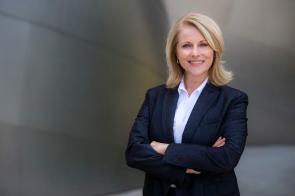
Whenever I speak with candidates who want to move from one practice area to another, and from one city to another, my advice is to pick one to try to do first - either move locations or practice groups, and that you cannot do both at the same time. Firms are reticent to hire anyone who wants to change practices - they are looking for laterals to come in and feel an actual need and in order to do that, the candidates need to have the substantive experience sought at the right level, and not be looking to be retooled or retrained.
In 2017, we successfully moved her from an antitrust practice to an M&A practice at an AmLaw 100 firm in New York. Then, I presented the candidate's experience relevant to an M&A practice: she advised both U.S. and international clients in connection with cross-border M&A transactions, joint ventures, and other business arrangements. She performed due diligence and antitrust analysis on these deals, and she assisted in researching and drafting FTC "white papers" outlining efficiencies of contemplated pharmaceutical M&A transactions.
I advised the candidate that she needed to practice at her new firm in M&A for at least a year to two years before trying to make the geographic move she desired from New York to Miami. She did, and gained very valuable experience, as she was at a firm that staffed deals very leanly. The candidate and I kept in touch, and we kept building her deal sheet together.
Two months shy of two years, we thought she had gained enough M&A experience to try to make the move within the practice to a firm in Miami, and started to take a close look at the current market in Miami. There were not many openings at this time, and the candidate did not have the Spanish skills many firms in Miami require. I told the candidate that her strength of her candidacy, coupled with the fact that she was moving home, and with New York City BigLaw training, we could be aggressive in proactively reaching out to firms that had not come to us with affirmative needs. She agreed, and we reached out to every sizeable, sophisticated deal practice with which we had a strong relationship in Miami, and this was close to 30 firms. Fairly quickly, we received interest from two firms, one is a regional firm, and another - quite interestingly - is a large, international firm that had two separate offices interested in meeting with her (Miami and West Palm Beach). She first spoke with two partners at the regional firm and ended the phone call with a lukewarm impression. The firm later told me the partners were impressed but didn't think she had the exact kind of experience they could use.
The candidate then had her interview with the West Palm Beach office of the larger firm. She had a similar experience as with the regional firm. The West Palm Beach office decided to pass on her candidacy after the initial phone call. A couple weeks later, she had her phone interview with the Miami office and it went very well. The candidate was invited to callbacks in person and within a few days after she flew out to meet with the group in person, the firm's Miami office made her a strong offer.
I have not ever had any candidate interview with two different offices of the same firm simultaneously, let alone be passed upon by one office, and then to receive an offer from the second office. This taught me that our market knowledge, understanding of how different firms operate (centralized versus localized recruiting), and our relationships with internal stakeholders at firms are key to meeting our candidates' goals. When I approached the firm's two different offices, I discussed with each office the candidate's reason for applying to both, and why each office made sense, as the two are in close proximity to each other and have strong corporate practices. Both offices agreed that it made sense that the candidate be considered by each as each operates as a sort of separate entity and each partner has his/her own practice with personal clients in addition to institutional clients. To this day, the candidate thanks me for having the firm knowledge and relationships within to have encouraged and enabled her to apply to both offices. She tells me – and reasonably so - what I assume every candidate would think: she would not have ever applied to both offices and once passed upon by the first office, she would have assumed that the firm was not an open for her in Florida.
About Harrison Barnes
Harrison Barnes is a prominent figure in the legal placement industry, known for his expertise in attorney placements and his extensive knowledge of the legal profession.
With over 25 years of experience, he has established himself as a leading voice in the field and has helped thousands of lawyers and law students find their ideal career paths.
Barnes is a former federal law clerk and associate at Quinn Emanuel and a graduate of the University of Chicago College and the University of Virginia Law School. He was a Rhodes Scholar Finalist at the University of Chicago and a member of the University of Virginia Law Review. Early in his legal career, he enrolled in Stanford Business School but dropped out because he missed legal recruiting too much.
Barnes' approach to the legal industry is rooted in his commitment to helping lawyers achieve their full potential. He believes that the key to success in the legal profession is to be proactive, persistent, and disciplined in one's approach to work and life. He encourages lawyers to take ownership of their careers and to focus on developing their skills and expertise in a way that aligns with their passions and interests.
One of how Barnes provides support to lawyers is through his writing. On his blog, HarrisonBarnes.com, and BCGSearch.com, he regularly shares his insights and advice on a range of topics related to the legal profession. Through his writing, he aims to empower lawyers to control their careers and make informed decisions about their professional development.
One of Barnes's fundamental philosophies in his writing is the importance of networking. He believes that networking is a critical component of career success and that it is essential for lawyers to establish relationships with others in their field. He encourages lawyers to attend events, join organizations, and connect with others in the legal community to build their professional networks.
Another central theme in Barnes' writing is the importance of personal and professional development. He believes that lawyers should continuously strive to improve themselves and develop their skills to succeed in their careers. He encourages lawyers to pursue ongoing education and training actively, read widely, and seek new opportunities for growth and development.
In addition to his work in the legal industry, Barnes is also a fitness and lifestyle enthusiast. He sees fitness and wellness as integral to his personal and professional development and encourages others to adopt a similar mindset. He starts his day at 4:00 am and dedicates several daily hours to running, weightlifting, and pursuing spiritual disciplines.
Finally, Barnes is a strong advocate for community service and giving back. He volunteers for the University of Chicago, where he is the former area chair of Los Angeles for the University of Chicago Admissions Office. He also serves as the President of the Young Presidents Organization's Century City Los Angeles Chapter, where he works to support and connect young business leaders.
In conclusion, Harrison Barnes is a visionary legal industry leader committed to helping lawyers achieve their full potential. Through his work at BCG Attorney Search, writing, and community involvement, he empowers lawyers to take control of their careers, develop their skills continuously, and lead fulfilling and successful lives. His philosophy of being proactive, persistent, and disciplined, combined with his focus on personal and professional development, makes him a valuable resource for anyone looking to succeed in the legal profession.
About BCG Attorney Search
BCG Attorney Search matches attorneys and law firms with unparalleled expertise and drive, while achieving results. Known globally for its success in locating and placing attorneys in law firms of all sizes, BCG Attorney Search has placed thousands of attorneys in law firms in thousands of different law firms around the country. Unlike other legal placement firms, BCG Attorney Search brings massive resources of over 150 employees to its placement efforts locating positions and opportunities its competitors simply cannot. Every legal recruiter at BCG Attorney Search is a former successful attorney who attended a top law school, worked in top law firms and brought massive drive and commitment to their work. BCG Attorney Search legal recruiters take your legal career seriously and understand attorneys. For more information, please visit www.BCGSearch.com.





